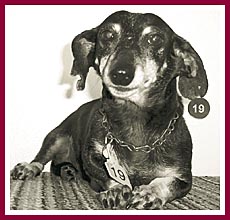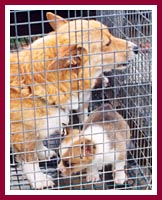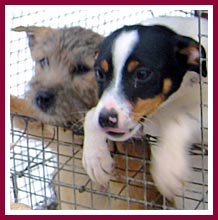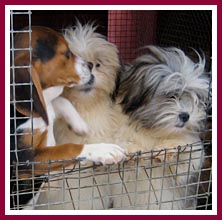|
||||||||
|---|---|---|---|---|---|---|---|---|
| What Is A Puppy Mill? * What Can I Do About It? * Laws/Legislation * ACTION ALERTS! |
||||||||
All of these sections are open to interpretation, making enforcement difficult, if not impossible — frustrating citizens and law enforcement investigators alike. The existing statutes are why millers like the one profiled in Interview with a WI "Puppy Farmer" and the 2008 photo above could not have been put out of business. By the existing statutes at the time, they weren't breaking any laws!
Currently in Wisconsin, there are over 150 certified Humane Officers who are conversant with both the law and what needs to be done to enforce and prosecute. If you see neglect or abuse, please check to see if there is a Humane Officer in your area! If you suspect that a breeder is in violation of 2009 Wisconsin Act 90, you can file a complaint with the WI Dept. of Agriculture, Trade, and Consumer Protection (DATCP). Click here for more information. If you do not live in Wisconsin and want to know what the humane laws are in your state, you can look up this information on the ASPCA State Animal Cruelty Law Summaries page. |
Top |
|
|
||||||||||||||||||||||||||||||||
Except for Wisconsin and a few other states, when a petstore brags that it sells "only dogs from licensed sources," it is very likely that the USDA is the sole licensing agency. Yet articles in the Fall 2018 issue of The Alliance Speaks, newsletter of the Missouri Alliance for Animal Legislation, contend that: "USDA believes that state and local restrictions are seriously affecting the economic viability of the commercial dog breeding industry. In response, USDA initiated steps to enhance the image of puppy mills a few years ago by covering up violations of the AWA at puppy mills. This past year, USDA has ramped up its efforts to conceal poor conditions at puppy mills amid mounting concerns about the continuing bad reputation of the industry." Is the USDA "turning a blind eye" to abuses and letting down the very animals the Animal Welfare Act was created to protect? Read more here! |
| UPDATE: On August 18, 2017, the USDA Animal and Plant Health Inspection Service (APHIS) announced the rollout of the refined public search tool that provides access to Animal Welfare Act compliance records. The public search tool is a component of the Animal Care Information System (ACIS) and will allow APHIS to make animal welfare information publicly available and ensure compliance with all applicable laws*. Click here for more information . NOTE: On February 3, 2017, the
USDA announced that "As a result of the comprehensive review, APHIS has
implemented actions to remove certain personal information from documents it
posts on APHIS’ website involving the Horse Protection Act (HPA) and the
Animal Welfare Act (AWA). Going forward, APHIS will remove from its website
inspection reports, regulatory correspondence, research facility annual
reports, and enforcement records that have not received final adjudication.
APHIS will also review and redact, as necessary, the lists of licensees and
registrants under the Animal Welfare Act, as well as lists of designated
qualified persons (DQPs) licensed by USDA-certified horse industry
organizations." Click here for more information and some suggestions about what
you can do. |
 "APHIS [US
Dept. of Agriculture Animal and Plant Health Inspection Service] provides
leadership for determining standards of humane care and treatment of animals.
APHIS implements those standards and achieves compliance through inspection,
education, and cooperative efforts." (APHIS Animal Welfare "home" page)
"APHIS [US
Dept. of Agriculture Animal and Plant Health Inspection Service] provides
leadership for determining standards of humane care and treatment of animals.
APHIS implements those standards and achieves compliance through inspection,
education, and cooperative efforts." (APHIS Animal Welfare "home" page)
The "Animal Welfare Act, United States Code Title 7 -- Agriculture Chapter 54 -- Transportation, Sale, and Handling of Certain Animals" spells out the regulations covering the breeding, selling, and transportation of pet animals. Sec. 2131 is the Congressional statement of policy:
The Congress finds that animals and activities which are regulated under this chapter are either in interstate or foreign commerce or substantially affect such commerce or the free flow thereof, and that regulation of animals and activities as provided in this chapter is necessary to prevent and eliminate burdens upon such commerce and to effectively regulate such commerce, in order--
(1) to insure that animals intended for use in research facilities or for exhibition purposes or for use as pets are provided humane care and treatment;
(2) to assure the humane treatment of animals during transportation in commerce; and
(3) to protect the owners of animals from the theft of their animals by preventing the sale or use of animals which have been stolen.
The Congress further finds that it is essential to regulate, as provided in this chapter, the transportation, purchase, sale, housing, care, handling, and treatment of animals by carriers or by persons or organizations engaged in using them for research or experimental purposes or for exhibition purposes or holding them for sale as pets or for any such purpose or use.
You can find out more about the Animal Welfare Act (AWA) on the AWA section of the US Dept. of Agriculture/Animal and Plant Health Inspection Service (APHIS) website, including a breakdown of the Animal Welfare Act in its entirety. Briefly, however:
|
The AWA licenses and oversees facilities in the United States which deal in animals for commerce. AWA categories for licensees include Carriers, Dealers, Exhibitors, Federal Research Facilities, Handlers, Research Facilities (other than federal), and VA Hospitals, as well as pet breeders. As for those pet breeders — only those who sell pets wholesale (to pet stores, research facilities, etc.) are covered — once again bypassing our friend the puppy miller mentioned above and any others who only sell retail, directly to customers through ads in newspapers, classified papers, etc. |
|
The AWA does have specific rules and regulations for the minimum requirements, and they do try to enforce them. However, there are just over 100 inspectors nationwide, tasked with overseeing about 10,000 facilities! |
|
|
The USDA is constantly changing and evolving its regulations to keep up with the changing face of pet retail. On September 10, 2013, they announced a revised and updated definition of “retail pet store” under the Animal Welfare Act to help ensure the health and humane treatment of pet animals sold sight unseen via phone, internet, and mail! For more background and information, please read Internet-based Puppy Mills now Subject to USDA Regulation and USDA Restores Important Check and Balance on Retail Pet Sales to Ensure Health, Humane Treatment (pdf).
On August 15, 2014, the USDA announced a revised and updated definition to help crack down on the import of puppies from foreign puppy mills. In brief, the new rule requires that puppies be at least 6 months of age, have veterinary certificates from their country of origin attesting to their good health, AND be vaccinated for rabies, distemper, hepatitis, leptospirosis, parvovirus, and parainfluenza virus (DHLPP) "at a frequency that provides continuous protection of the dog from those diseases and is in accordance with currently accepted practices as cited in veterinary medicine reference guides." See USDA Closes Another Loophole: New Regs for Import of Foreign Puppy Mill Puppiesfor more details, and read the final rule, USDA Animal Welfare; Importation of Live Dogs here.
![]() USDA Closes Another Loophole: New Regs for Import of Foreign
Puppy Mill Puppies
USDA Closes Another Loophole: New Regs for Import of Foreign
Puppy Mill Puppies ![]()
By the way, the dog whose photo is at the beginning of this section came from a USDA-licensed "breeding facility." For her story, and more about USDA "Identification of Animals" regulations, please see: Little Tag 19
Top
![]() "Chapter 951: Crimes Against Animals"
(pdf)
"Chapter 951: Crimes Against Animals"
(pdf) ![]() USDA/APHIS Animal Welfare Act "home"
page
USDA/APHIS Animal Welfare Act "home"
page ![]()
![]() Reporting Animal Cruelty
Reporting Animal Cruelty ![]() WI Certified Humane
Officers
WI Certified Humane
Officers ![]()
![]() Little Tag
19 and the USDA Identification of Animals Regulations
Little Tag
19 and the USDA Identification of Animals Regulations ![]()
![]() List of Active Licensees and Registrants under the AWA
(pdf)
List of Active Licensees and Registrants under the AWA
(pdf) ![]() AWA
Inspection and Annual Reports
AWA
Inspection and Annual Reports ![]()
|
|
|
Home * About WPMP * Contact Us * Site Search * Donate
What is a Puppy Mill? * Puppy Mill Survivors * Photo Album * The Petstore Connection
Dog Auctions * Animal Hoarding * What YOU Can Do
Laws/Legislation * Act 90/S.173.41/ WI Dog Program * Filing a Complaint Against a WI Dog Seller
Guide to Finding a Pet * Breeders With Pride * Rehoming: Free To Good Home?
©
Copyright, 2008. The Wisconsin Puppy MIll Project
P.O. Box 926 * Sheboygan, WI
53082-0926 * info@NoWisconsinPuppyMills.com
PhotoCopyright © 1999, by Elizabeth Meadows. All Rights Reserved. Used with permission.
Website design by Hook & Web Designs



